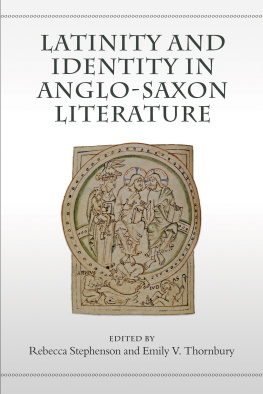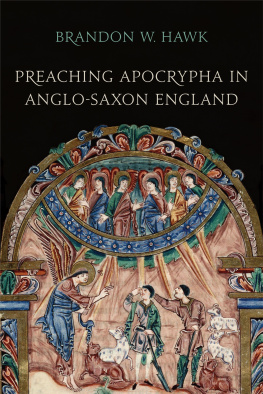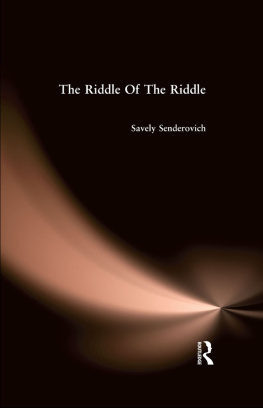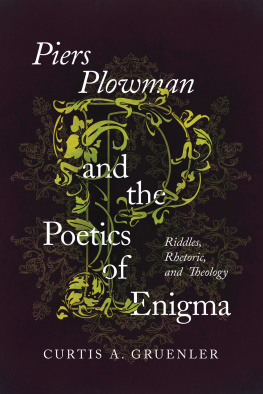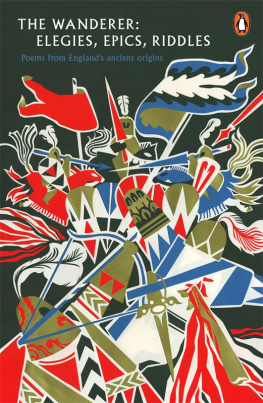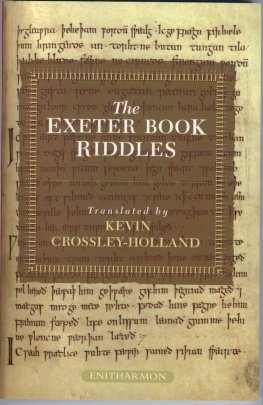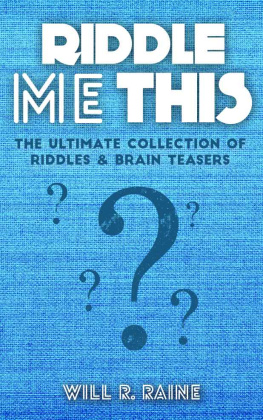SAY WHAT I AM CALLED: THE OLD ENGLISH RIDDLES OF THE EXETER BOOK AND THE ANGLO-LATIN RIDDLE TRADITION
University of Toronto Press Incorporated 2009
Toronto Buffalo London
www.utppublishing.com
Printed in Canada
ISBN 978-0-8020-9352-3

Printed on acid-free paper
Toronto Anglo-Saxon Series
Library and Archives Canada Cataloguing in Publication
Bitterli, Dieter
Say what I am called : the Old English riddles of the Exeter Book and the Anglo-Latin riddle tradition / Dieter Bitterli.
(Toronto Anglo-Saxon series)
Includes bibliographical references and index.
ISBN 978-0-8020-9352-3
1. Riddles, English (Old) History and criticism. 2. English poetry Old English, ca. 4501100 History and criticism. 3. Riddles in literature.
I. Title. II. Series: Toronto Anglo-Saxon series
PR1764.B58 2009 829'.1009 C2008-907710-5
Published with support of the Swiss National Science Foundation.
University of Toronto Press acknowledges the financial assistance to its publishing program of the Canada Council for the Arts and the Ontario Arts Council.
University of Toronto Press acknowledges the financial support for its publishing activities of the Government of Canada through the Book Publishing Industry Development Program (BPIDP).
swsum ond gesibbum
Contents
Acknowledgments
The Anglo-Saxon riddles about the business of writing and book-making tell us that the painstaking labour of producing a book is ultimately rewarded both in heaven and on earth. In the figurative language of the riddle-poets, the scribes pen irrigates the furrows on the page, which will yield a rich harvest for the benefit of the readers. In the years it took to complete this book from its once dry furrows to its present crop I have been fortunate to receive the expert guidance and help of several colleagues and friends. A great part of my research was conducted at the English Department of the University of Zurich, where Udo Fries taught me the mysteries of Old English language and literature, and where Andreas Fischer encouraged me to develop an early paper on the Exeter Book Riddles into a book-length study. I am deeply grateful to both of them for their continuing support and friendship.
Of those who have contributed to this book in various ways and gave generously of their time, I would like to single out for special thanks Hans Sauer, Peter Stotz, Andy Torr, Hildegard L.C. Tristram, Margaret Tudeau-Clayton, and the two anonymous reviewers for the University of Toronto Press; they all read sections of this book in draft and helped to improve it by their perceptive criticisms and suggestions.
I am greatly indebted to Andy Orchard, the editor of the Toronto Anglo-Saxon series, and to Suzanne Rancourt, of the University of Toronto Press, for the trust and confidence that they have had in my project, and for their encouragement and patience. To Barb Porter and Catherine Frost of the Press I extend particular thanks for their skill in correcting and copy-editing my manuscript in its various stages; they heroically ploughed hundreds of acres of archaic language and runic ciphers with unfailing expertise and endurance. The printing was supported by generous grants from the Swiss National Science Foundation and the Dr Josef Schmid-Stiftung.
This book is dedicated to my family, Barbara, Eleonora, Valentina, and Frederic swsum ond gesibbum you made me feel less lonely while I was sitting at my desk, typing with three fingers, not unlike a monk in his scriptorium: Three fingers write, and the whole body labours. Even the medieval authors knew that writing a book is a labour of love.
Abbreviations and Symbols
ASE | Anglo-Saxon England |
ASPR | The Anglo-Saxon Poetic Records. Ed. G.P. Krapp and E.V.K. Dobbie. 6 vols. New York: Columbia University Press, 193142 |
BT | An Anglo-Saxon Dictionary. Ed. J. Bosworth and T.N. Toller. Oxford: Clarendon Press, 188298; and An Anglo-Saxon Dictionary: Supplement. Ed. T.N. Toller. Oxford: Clarendon Press, 190821 |
CCCM | Corpus Christianorum: Continuatio Mediaevalis. Vols 1. Turnhout: Brepols, 1966 |
CCSL | Corpus Christianorum: Series Latina. Vols 1. Turnhout: Brepols, 1953 |
CSASE | Cambridge Studies in Anglo-Saxon England |
CSEL | Corpus scriptorum ecclesiasticorum Latinorum. Vols 1. Vienna, 1866 |
DML | Dictionary of Medieval Latin from British Sources. ed. R.E. Latham, D.R. Howlett, et al. Vols 1. Oxford: Oxford University Press, 1997 |
DOE | Dictionary of Old English. Ed. A. Cameron et al. Toronto: Pontifical Institute of Mediaeval Studies, 1986 |
EETS OS | Early English Text Society. Original Series. Vols 1. London: Kegan Paul, Trench, Trbner, 1864 |
Gmc | Germanic |
IE | Indo-European |
Lat. | Latin |
MCOE | Venezky, Richard L., and Antonette di Paulo Healey. A Microfiche Concordance to Old English. Newark and Toronto: University of Delaware Press, 1980 |
ME | Middle English |
MED | Middle English Dictionary. Ed. Hans Kurat, Sherman M. Kuhn, and Robert E. Lewis. Vols 1. Ann Arbor: University of Michigan Press, 1954 |
MGH | Monumenta Germaniae historica. Hanover and Berlin: Weidmann, 1826 |
MGH AA | Monumenta Germaniae historica: Auctores antiquissimi. 15 vols |
MGH EPP | Monumenta Germaniae historica: Epistolae |
MGH PP | Monumenta Germaniae historica: Poetae Latini medii aevi. 6 vols |
MLat. | Medieval Latin |
MLW | Mittellateinisches Wrterbuch bis zum ausgehenden 13.Jahrhundert. Ed. O. Prinz, J. Schneider, et al. Vols 1. Munich: C.H. Beck, 1967 |
ModE | Modern English |
ModG | Modern German |
NGML | Novum Glossarium Mediae Latinitatis. Ed. F. Blatt et al. Vol. L. Copenhagen: Ejnar Munksgaard, 1957 |
OE | Old English |
OED | The Oxford English Dictionary. 2nd ed. Ed. J.A. Simpson and E.S.C. Weiner. 20 vols. Oxford: Oxford University Press, 1989 |
OF | Old French |
OHG | Old High German |
OLD | Oxford Latin Dictionary. Ed. P.G.W. Glare. Oxford: Clarendon Press, 1982 |
PL | Patrologiae cursus completus: Series Latina. Ed. J.-P. Migne. 217 vols. 4 vols index. 5 vols supplement. Paris, 18441974 |
pl. | plural |
pret. | preterite |
RS | Rerum Britannicarum medii aevi scriptores. Rolls Series |
stv | strong verb |
WS |
Next page


